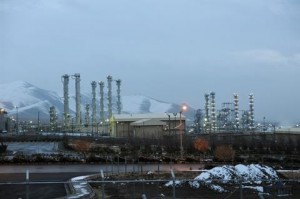 (Reuters) - World powers expressed hope on Tuesday of resuming negotiations with Iran over its disputed nuclear program "as soon as possible" but gave no indication of a possible date for any new talks.
(Reuters) - World powers expressed hope on Tuesday of resuming negotiations with Iran over its disputed nuclear program "as soon as possible" but gave no indication of a possible date for any new talks.
Senior diplomats from the six countries negotiating with Tehran - the United States, Russia, China, France, Britain and Germany - met in Brussels to map out plans for diplomacy following the June 14 presidential election in Iran.
Negotiations have been on hold since a failed round in April and the six nations are keen to get back to the table amid concerns a breakdown in diplomacy could prompt Israel to attack Iran and spark a new war in the Middle East.
The European Union's foreign policy chief Catherine Ashton, who oversees talks with Iran on behalf of the six powers, said they were waiting for Tehran to nominate a team of negotiators after the presidential vote, before making concrete plans.
"We very much hope that will be soon and we look forward to meeting with them as soon as possible," she said in a statement.
The election of a relative moderate, Hassan Rouhani, on June 14 has raised some hopes for a resolution of the long-running dispute over Iran's nuclear intentions.
The six powers believe Iran is seeking the means to make bombs, and have demanded Tehran abandon its most sensitive nuclear work. But Tehran denies that and says it needs atomic power for energy generation and medical research.
Russia has expressed frustration over a lack of progress in diplomacy but Western diplomats have cautioned that it was unclear whether Iran was ready to make a deal.
Rouhani, who takes office in August, has pledged a less confrontational approach than his predecessor, Mahmoud Ahmadinejad, under whose presidency, over the last eight years, Iran has come under increasingly tough international sanctions.
But Iran's Supreme Leader Ayatollah Khamenei has the final say on nuclear policy.
CAUTION IN WASHINGTON, ANXIETY IN ISRAEL
So far, Western diplomats have said the next move in diplomacy belonged to Iran, urging it to accept an offer of moderate sanctions relief in exchange for curbs in the nuclear work, extended in Kazakhstan earlier this year.
But nuclear experts have said the West may have to refine its strategy to help Rouhani strike a deal.
A former senior U.S. administration official said last week it was not yet known whether Rouhani's election would improve the prospects for a nuclear deal, but that Washington and its allies would need to move quickly if they were to take advantage of whatever opportunity may exist after the vote.
"There will be a natural tendency within the administration to stand pat for now and wait to see whether the new Iranian government will alter its approach when talks resume," Robert Einhorn, the U.S. State Department's nonproliferation adviser until last May, wrote in a July 10 Foreign Policy article.
"Such caution is understandable, especially given Iran's disappointing track record."
But, he said, "The United States needs to do everything it can in the weeks and months ahead to prepare itself for any promising opportunity that presents itself when talks resume."
The efforts are being closely watched in Israel, widely believed to be the only nuclear power in the Middle East.
Prime Minister Benjamin Netanyahu said on Sunday that Iran was getting closer to the "red line" he set for its nuclear work, a level at which Israel thinks Iran will have amassed enough uranium to fuel one nuclear bomb.
Officials also have expressed concern that the six powers might be willing to accept a compromise offer from Iran that would fall far short of Israeli expectations.
Senior Israeli official have told Reuters they were worried Tehran would propose to temporarily suspend the enrichment of uranium to 20 percent, one of the six powers' three demands, and that they would accept it, giving up on the other two.
"This proposal is totally unacceptable from Israel's perspective," one official said.
The six powers have asked Iran to ship out its stockpile of 20-percent uranium and to close a facility where such work is done.
By Reuters
The Iran Project is not responsible for the content of quoted articles.

 QR code
QR code